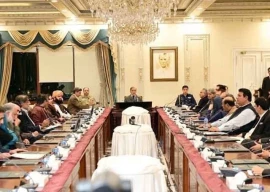
Senior police officers from across the country have called for better inter-provincial coordination to fight crime and terrorism in the post 9/11 world.
They were debating the topic ‘Policing in Pakistan: Challenges and Responses’ at a seminar arranged by the Sindh police at Pearl Continental hotel on Monday. It seemed as if the entire police force had turned up because around 50 vans were protecting the area. However, unlike the clichéd impression of police wallahs in Pakistan, here all officers spoke in perfectly accented English and some even wore dark suits and ties. Even DSP-level officers, who were no match for their senior officers in their flair for the Queen’s language, also made an effort to talk only in English.
Newly appointed Capital City Police Officer Saud Mirza gave a hard-hitting speech in which he became the first to admit that police leadership over the years has lacked vision and strategy. He said the greatest failure in the struggle against terrorists was that institutional responses over the past ten years have been disproportionate. He lamented that despite bearing the brunt of major terrorist attacks, “we have neither a consistent holistic policy at the national level nor do we have a specific counter-terrorism policy in any of the provinces.”
He clarified that he was not questioning the courage of his police force, many of who have died in the line of duty. “Instead, what I question is our failures as leaders and as strategic thinkers.” A sense of urgency is needed in investigating new types of offences and training and developing systemic responses to threats that attack our society systematically.
Inspector-General Sindh Fayyaz Leghari, who was supposed to give the welcome address, arrived fashionably late. He promised that the seminar would not be a futile effort and that suggestions given by all officers would be taken up at a meeting on Tuesday with the IGs of all provinces.
AIG Operations Islamabad Eshan Sadiq stressed that unless the police force got rid of the menace of corruption inherent in its institution, the public would remain wary and distrustful. He called for criminal justice committees as envisioned in Police Order 2002.
DIG Punjab Zaffar Abbas Lak said it was a fact that police officers today were more interested in getting lucrative postings than caring for better policing. He said the police alone can’t do the job and he called for political leaders and the judiciary to play their due roles. “Like Musharraf’s government, the present government too has not shown much interest in implementing police reforms,” he said.
AIG Special Branch Khyber-Pakhtunkhwa Syed Akhtar Ali Shah said that contrary to popular belief, people were still being killed more by road accidents and family feuds than terrorism in his province. Describing the challenges his police officers faced, he recalled that in July 2007, Taliban’s Mullah Fazlullah had given a sermon on his illegal FM channel, calling on police officers to either quit their jobs or get ready to be literally slaughtered like goats. While he said there was no question that many Taliban and al Qaeda extremists have found sanctuaries in his province, he believed that “most of the jihadi literature being produced today and even the ideological (Salafi) leadership, is based in the Punjab.”
Commandant Balochistan Constabulary Ghulam Shabbir Shah explained the phenomenon of target killings in his province and described in great detail the ethnic divisions being exploited by various groups. He said that since Baloch leader Akbar Bugti died in 2006, August remains the peak month for target killings in the province for some strange reason. He said like the Urdu-speaking professor Nazina Talib who was killed in 2010, Punjabi traders were also being picked off. “There’s a joke in Balochistan that one can’t find barbers since all of them have left for the Punjab,” he said. Without taking names of any intelligence agency or foreign conspiracies, he stated that the entire Makran belt is up in arms today after three bodies of their leaders were discovered near the border with Iran.
AIG Forensics Division Sindh Sharjeel Karim Kharal, who is also a Chevening scholar, said that traditionally the police never gave any attention to forensics. It has been only three years since they’ve been able to get an automated system up and running in the province. They have a database of around 200,000 suspects but the success rate was still low since they need more data input and one stumbling block is that Nadra refuses to share its database with the forensics body.
The septuagenarian former IG Sindh Manzoor Sheikh, who is these days teaching at an American university in Houston, said that it was unfair of the public to expect justice and respect from the police force, when they themselves don’t do the same. He also questioned why a mockery was being made of police officers in the Benazir Bhutto assassination case.
Hinting at the intrusive role of the intelligence agencies even in police cases, he said: “From the Tayyara Sazish case to Akbar Bugti’s murder and now BB’s assassination, everybody knows who really was behind them, but instead police officers are made the scapegoat.”
Published in The Express Tribune, April 12th, 2011.































-(1)1714378140-0/AliAminMaryam-(4)-(1)1714378140-0-270x192.webp)

1714370039-0/ojwilson-(1)1714370039-0-270x192.webp)







COMMENTS
Comments are moderated and generally will be posted if they are on-topic and not abusive.
For more information, please see our Comments FAQ